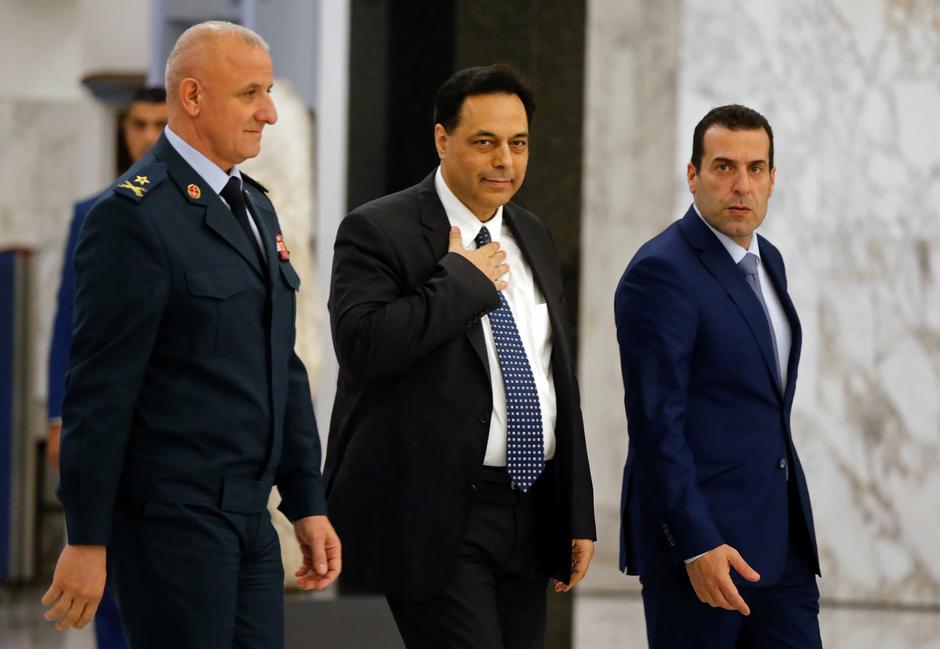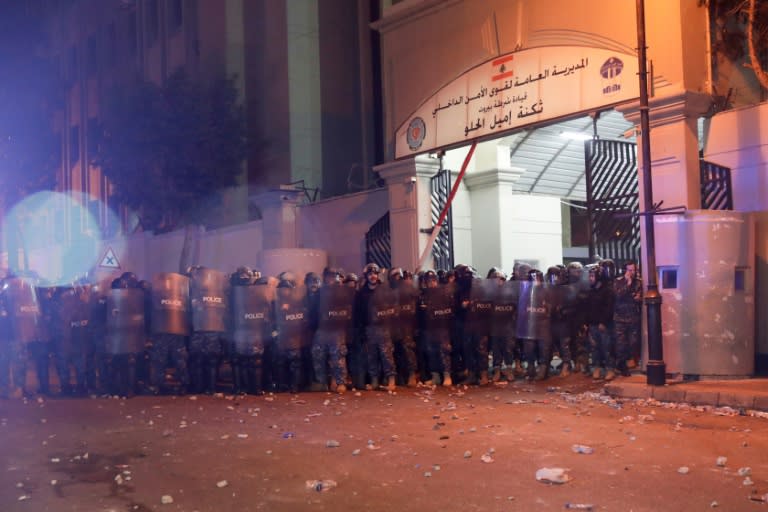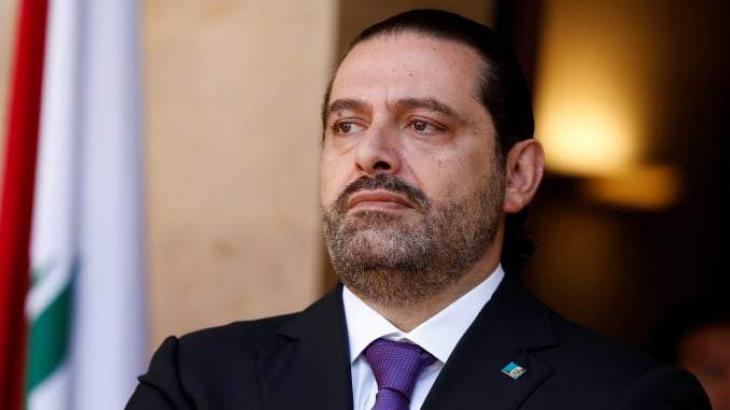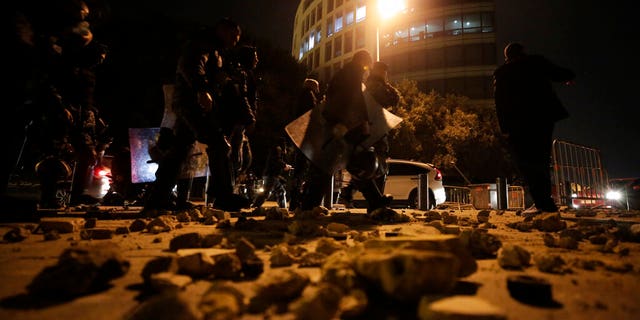
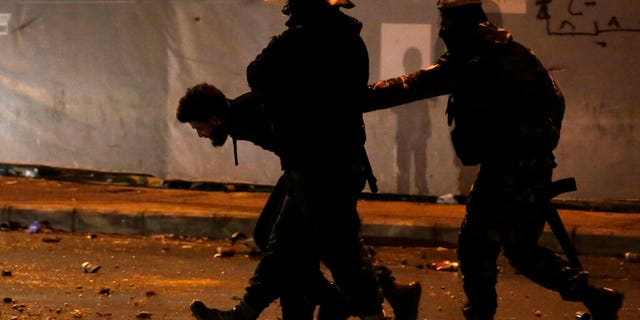
by AP — Lebanese security forces prepared for more violence on Sunday after a night of protests over the country’s worsening financial situation gripped Lebanon’s capital. Demonstrators used rocks and other projectiles early Sunday while security forces responded by firing tear gas canisters and water cannons, before turning to rubber bullets. A few protesters tried to breach metal barriers that separated them from the riot police, while hundreds more gathered down the blocked street leading to the Parliament building.
At least 70 people were injured in the first 90 minutes of the clashes, including 30 transported to hospitals for treatment, according to the Red Cross. Reporters on the scene said most of the injured were from rubber bullets. Earlier Sunday, security forces reinforced the metal barriers surrounding the Parliament building in central Beirut, after the worst night of violence since protests erupted several months ago. Saturday’s clashes left nearly 400 people injured, according to the Red Cross and the Lebanese Civil Defense. Lebanon’s Internal Security Forces said 142 of its members were injured, some with serious concussions. Lebanon’s military made a show of force on Sunday, heavily deploying in downtown Beirut and patrolling ahead of the rallies. Riot police were in the front line guarding Parliament.
Sunday’s unrest comes a day after President Michel Aoun called on the military to intervene as fierce clashes broke out between protesters and police. “We’re not scared. This is all for our future and our children,” shoemaker Bassam Taleb told Reuters at the protest. “The country is frozen. The state is not doing a thing, they’re a bunch of thieves. And if you have money in the bank, you can’t even get a hundred dollars out.” Earlier in Beirut on Sunday, shopkeepers, banks and other businesses swept up broken glass and boarded-up windows. Workers at one bank took down the large sign with its name to remove any identifier and avoid soliciting anger from protesters, who smashed the windows and the facade of Lebanon’s Banking Association headquarters with metal bars on Saturday. The demonstrators widely blame Lebanese financial institutions, alongside government corruption, for the crippling economic crisis. The Associated Press contributed to this report.
An AFP photographer at the scene said security forces fired rubber bullets at stone-throwing protesters as thick clouds of tear gas covered central Beirut. On Sunday, local television aired the testimonies of relatives of two young men they said were hit in the eyes by rubber bullets. Human Rights Watch condemned what it called “the brutal use of force unleashed by Lebanon’s riot police against largely peaceful demonstrators”. “Riot police showed a blatant disregard for their human rights obligations, instead launching tear gas canisters at protesters’ heads, firing rubber bullets in their eyes and attacking people at hospitals and a mosque,” said its deputy Middle East director Michael Page. The authorities must act quickly “to end this culture of impunity for police abuse”, he said. Saturday’s clashes began after dozens of protesters threw stones and plant pots at security forces, and tried to charge police lines near parliament with traffic signs. The security forces responded with water cannon and thick tear gas. Protesters had called for a week of “anger” over the political leadership’s failure to form a new government even as the country sinks deeper into a financial crisis.
‘STOP WASTING TIME’
The NNA said around 30 people were briefly detained after the violence on Saturday. Security forces said they had opened an probe after a video shared online showed police beating up people believed to be protesters as they were brought to a Beirut police station. “Another day without a government, another night of violence and clashes,” UN envoy to Lebanon Jan Kubis said on Twitter. Outgoing prime minister Saad Hariri, who stepped down on October 29, urged political parties to “stop wasting time”. “Form a government and pave the way towards political and economic solutions,” he said.

This is an opinion article and does not necessarily represent khazen.org opinion
Syria’s invisible hand in Lebanon confronts Iran’s allies
by Dr Basem Shabb — Since October 17, a nationwide uprising took Lebanese by storm, forcing then prime minister Saad Hariri and his Cabinet to step down. In December, Iran-backed Hezbollah and its ally, the Christian Free Patriotic Movement, or FPM, were duped into naming Dr Hassan Diab, a Sunni academic, as prime minister designate. It is the prime minister designate’s duty by law to form the Cabinet but acting foreign minister and head of the FPM, Gebran Bassil mistakenly thought he could impose his preferred nominees on a relatively unknown prime minister and divide the spoils with Hezbollah. Much to the dismay of Mr Bassil, Mr Diab appears bent on forming a government of unaffiliated experts, in compliance with the demands of protesters. Mr Diab has challenged Mr Bassil as well as his father-in-law Lebanese President Michel Aoun, with active support from pro-Syrian politicians, most notably member of parliament Jamil Al Sayyed. Other pro-Syrian factions voiced their demands to be represented in the new government, effectively competing with the FPM for the next Cabinet’s 18 ministries.
It seems that Mr Diab, far from being weak and isolated, has considerable support from Pro-Syrian factions opposed to Mr Hariri. Grand Mufti Abdul Latif Darian and other Sunni dignitaries have refrained from criticising Mr Diab, avoiding the thorny issue of his legitimacy within the community. More importantly, the Saudi leadership has yet to take a position on Mr Diab, which may indicate that they are ready to give him a chance. Syrian President Bashar Al Assad has yet to comment on the situation but Druze politician Wiam Wahhab, one of Syria’s closest allies in Lebanon, has indicated he was the one to suggest Mr Diab for the position of prime minister. The Russians first endorsed Mr Hariri but after Mr Diab was officially nominated, they have assumed a neutral stance. Western powers are closely watching as Lebanese politicians bicker while the economy is in free fall.





